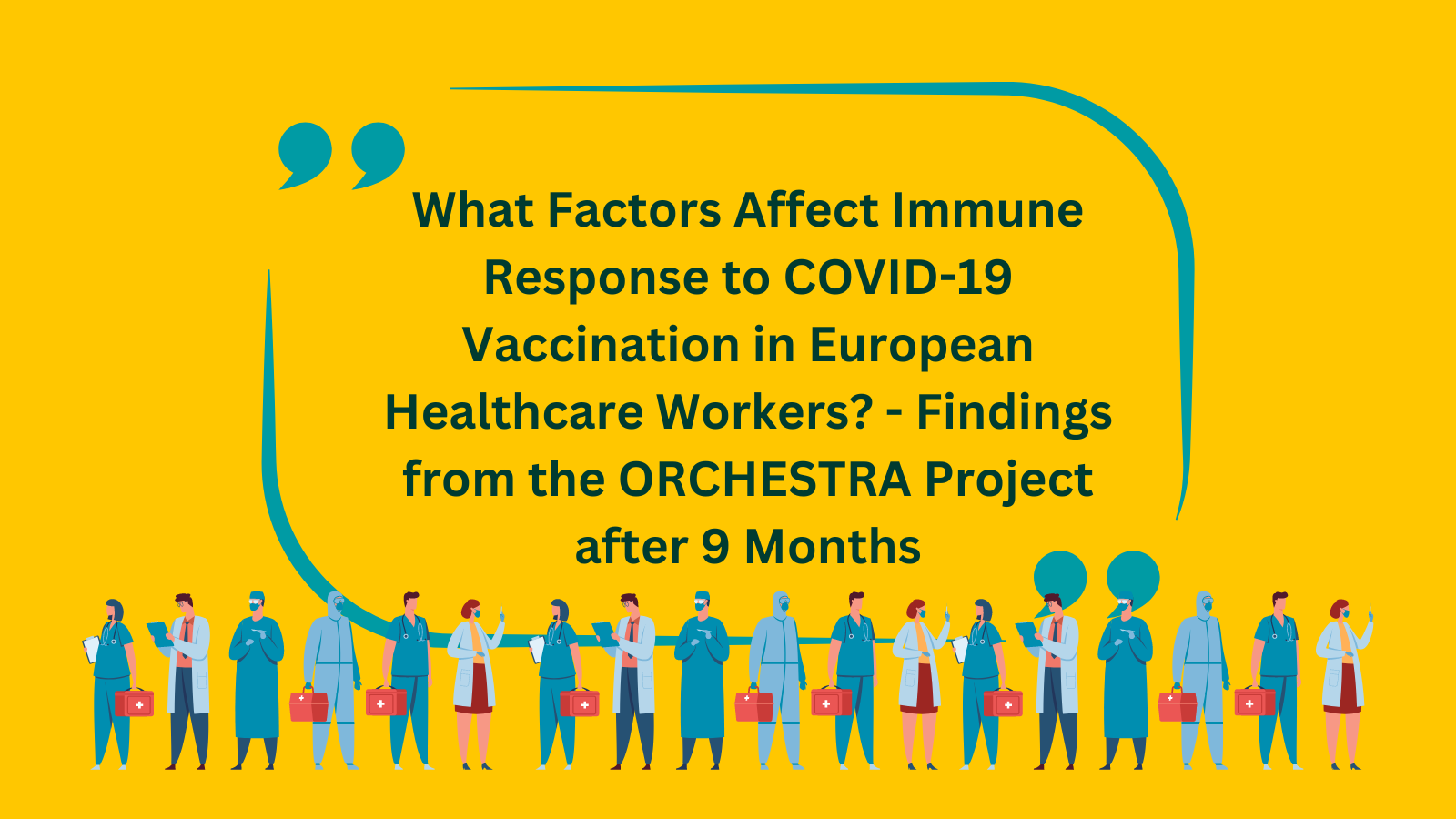What Factors Affect Immune Response to COVID-19 Vaccination in European Healthcare Workers? – Findings from the ORCHESTRA Project after 9 Months

“Determinants of Anti-S Immune Response at 9 Months after COVID-19 Vaccination in a Multicentric European Cohort of Healthcare Workers—ORCHESTRA Project” is a study conducted by ORCHESTRA partner University of Bologna and was performed within Work Package 5 “The Healthcare Workers Cohort”.
What is the specific research question and what did you look at?
Which factors affect the results of blood tests taken nine months after people get vaccinated in a group of many different places to understand why some people have different levels of antibodies in their blood after being vaccinated. By studying these factors, we hope to learn more about how to make vaccines work better for everyone.
How many cases from how many cohorts did you evaluate (if this is applicable)?
Italy—Bologna (4402 patients); Italy—Brescia (6250 patients); Italy—Trieste (1995 patients); Italy—Verona (3250 patients); Germany—Munich (3473 patients); Slovakia—Multicenter (567 patients); Spain—Northern Barcelona region (412 patients); Spain—Oviedo (127 patients).
How long did it take to get results?
After receiving the data, it took around 3 weeks to get the statistical results.
What are the results and answers?
In this study, we looked at 20,216 healthcare workers who had received up to two doses of a COVID-19 vaccine. We found that higher levels of antibodies in their blood were associated with female sex, younger age, previous COVID-19 infection, receiving two vaccine doses, and using certain types of vaccines like Spikevax or heterologous vaccination. Increasing time since last vaccination and Vaxzevria vaccine were associated with lower levels of antibodies.
In a subgroup of 3,979 people from one Italian center, we noticed that the average level of antibodies decreased over time from 8.17 to 7.06, with a significant trend over 7 months.
Was there anything unexpected/surprising that you found?
There are a few interesting findings in these results.
First, it is interesting to see that certain factors like age, sex, and vaccine type can influence antibody levels after COVID-19 vaccination. For example, the study found that women had higher antibody level than men, which is a data that could help researchers better understand the immune response to COVID-19 vaccines.
Second, the fact that the average antibody level decreased over time is noteworthy, as well as the evidence of the overall persistence of immunity. This suggests that the protection provided by COVID-19 vaccines may wane over time, despite persisting, and highlights the need for ongoing monitoring and potential booster shots.
Finally, the finding that one type of vaccine, Vaxzevria, was associated with lower antibody levels is also surprising and could have implications for vaccine policy and public health efforts.
Who benefits from your research?
Healthcare workers and the general population can benefit from this research by gaining a better understanding of how different factors can influence antibody levels after COVID-19 vaccination. This knowledge can help healthcare workers make more informed decisions about vaccination, such as whether or not to recommend a booster shot or a different vaccine type based on personal characteristics and clinical history.
Policymakers can benefit from this research by using the findings to inform their decisions about vaccine distribution and allocation. For example, if certain types of vaccines are associated with higher antibody levels, policymakers may prioritize the distribution of those vaccines to specific populations or regions.
Finally, the general public can benefit from this research by gaining a better understanding of the immune response to COVID-19 vaccines and how different factors can affect the level of protection provided by vaccines. This information can help individuals make more informed decisions about vaccination and can contribute to overall public health efforts to combat COVID-19.
What are your recommendations?
This study confirms that factors like age, sex, and vaccine type can influence the level of protection provided by the vaccine, and that people may need booster shots or ongoing monitoring to maintain their immunity over time.
Which ORCHESTRA partners are involved?
Italy—Bologna (4402); Italy—Brescia (6250); Italy—Trieste (1995); Italy—Verona (3250); Germany—Munich (3473); Slovakia—Multicenter (567); Spain—Northern Barcelona region (412); Spain—Oviedo (127)
Press contact:
Marlene Nunnendorf
ORCHESTRA Science Communication Officer
Email: marlene.nunnendorf@orchestra-cohort.eu
###